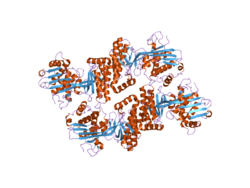Clinical significance
Defects can be associated with hyperimmunoglobulinemia D with recurrent fever. [10]
Mevalonate kinase deficiency caused by mutation of this gene results in mevalonic aciduria, a disease characterized psychomotor retardation, failure to thrive, hepatosplenomegaly, anemia and recurrent febrile crises. Defects in this gene also cause hyperimmunoglobulinaemia D and periodic fever syndrome, a disorder characterized by recurrent episodes of fever associated with lymphadenopathy, arthralgia, gastrointestinal dismay and skin rash. [6] The symptoms of the disease typically start at infancy and may be additionally triggered by stress or bacterial infection. Children with mevalonate kinase deficiency may remain undiagnosed for a long time as there is not enough scientific data at the moment to accurately diagnose children with the disease. [9]
This page is based on this
Wikipedia article Text is available under the
CC BY-SA 4.0 license; additional terms may apply.
Images, videos and audio are available under their respective licenses.








